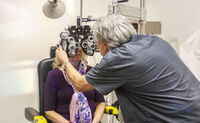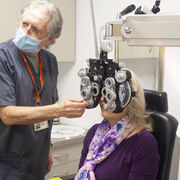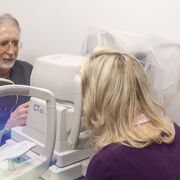- About
- Donate or Volunteer
- Programs & Services
- Events & Activities
- Call Center
- Highbrook Lodge
- Resources
Blog: Eye Care Specialists

Everyone’s vision and eye health are different, which require different maintenance and medical attention. There are three types of eye care specialists to turn to for a variety of eye health and vision related needs. This blog will distinguish between these types of eye care specialists: optometrists, ophthalmologists and opticians.

Optometrists
Optometrists have a doctor of optometry (OD) degree and attend optometry school. Optometrists diagnose and treat lots of common eye diseases and vision problems, but do not perform surgeries. This is the type of eye doctor typically visited for a regular eye exam. Cleveland Sight Center has optometrists who specialize in low vision to help clients understand their vision. They perform low vision evaluations and work directly with patients to determine which low vision aids and techniques will maximize their remaining vision and help them reach their goals.
Ophthalmologists
An ophthalmologist is either a medical doctor (MD) or a doctor of osteopathy (DO). They are also known as eye surgeons. After graduating from medical school, an ophthalmology student must complete three to eight years of internships and residency in a hospital or other medical institution. Their education and training make them qualified to research, diagnose and treat eye diseases. They may have a specialization that they focus on, like specific diseases or age groups. Ophthalmologists can diagnose and treat any condition that affects your eyes and vision, including surgery if necessary. Some eye issues an ophthalmologist may treat through surgery include: glaucoma, cataracts, retinal detachment and eye injuries. They can also conduct a regular eye exam.

The main differences between optometrists and ophthalmologists are their doctorate degree and whether or not they can perform surgery.
Opticians
Opticians are eye care specialists who tend to work with eye doctors. You may also see them working at stores that sell eye glasses. While opticians do not diagnose or treat your eyes, they will work with you to get the right vision corrective devices, like glasses or contacts, after your optometrist or ophthalmologist gives you a prescription.
Those with a history of vision problems are advised to get their eyes checked as often as their eye doctor recommends. Haven’t been to an eye doctor in a while? Talk to your primary care doctor to discuss how often you should get a standard eye exam.







